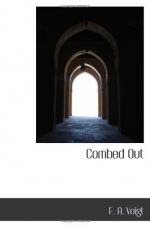We pushed the wheel up the ramp and returned to fetch heavy coils of wire, bundles of picks and shovels, sacks and barrels of nails. Our backs and shoulders ached, our hands and finger-tips were sore.
Another shell came whining over. It burst by a little cottage. Its thunder made our ears sing. The fragments of flying metal made us duck or scatter behind the stacks.
We worked until we almost dropped with sheer fatigue. Iron rods and bars for reinforcing pill-boxes, bags of cement, boxes of tools, parts of machinery, all went on to the train. Then we entered a big shed, where a number of tar-barrels stood in a row. We rolled them out and placed them by the timber stacks. We laid a pick beside each barrel so that it could be broached, the tar set alight, and the entire park destroyed at a moment’s notice.
It was dark when we stopped work. We reached camp after an hour’s wearisome marching. We waited in a long queue outside the cook-house. The cooks served out the greasy stew as quickly as they could, but we were so tired and ill-tempered that we shouted abuse at them without reason and without being provoked, and banged our plates and tins. The war, the advance, the slaughter were forgotten. We were conscious of nothing but weariness, stiffness, and petty irritation.
The following day we marched to a ration dump. The wooden cases of rations were piled up in gigantic cubes, so that the entire dump looked like a town of windowless, wooden buildings. We formed one long file that circled slowly past the stacks, each man taking one case on to his shoulder or back and carrying it to the train. And so we circled round and round throughout the monotonous day.
In the evening I did not wait in the dinner queue, but went to the St. Martin. It was kept by an old woman and her two daughters. They were tortured by anxiety:
“Les Allemands vont venir ici—de Shermans come heer?” they asked. But I knew no more than they did. I told them, against my own conviction, that the German advance would be held up, but they remained anxious. The uproar of the cannonade was louder than ever. All the windows of the building shook and rattled. The old woman muttered: “’Tis niet goet, ’tis niet goet,” and the elder daughter echoed: “Oh, ’tiss no bon, ’tiss no bon.”
Two British officers entered. They looked round and saw that private soldiers were sitting at the tables. But the St. Martin was the biggest estaminet in the village and provided the best wines and coffees, so they stood in the doorway, undecided what to do. They asked one of the girls if there was a restaurant for officers in the neighbourhood. She answered: “No—no restaurant for officeerss—you come heer—privates, zey no hurt you—privates, officeerss, all same.”
Encouraged by these assurances, one of the newcomers said to the other:
“Come on, let’s sit down here and have a coffee—we needn’t stop long.”




